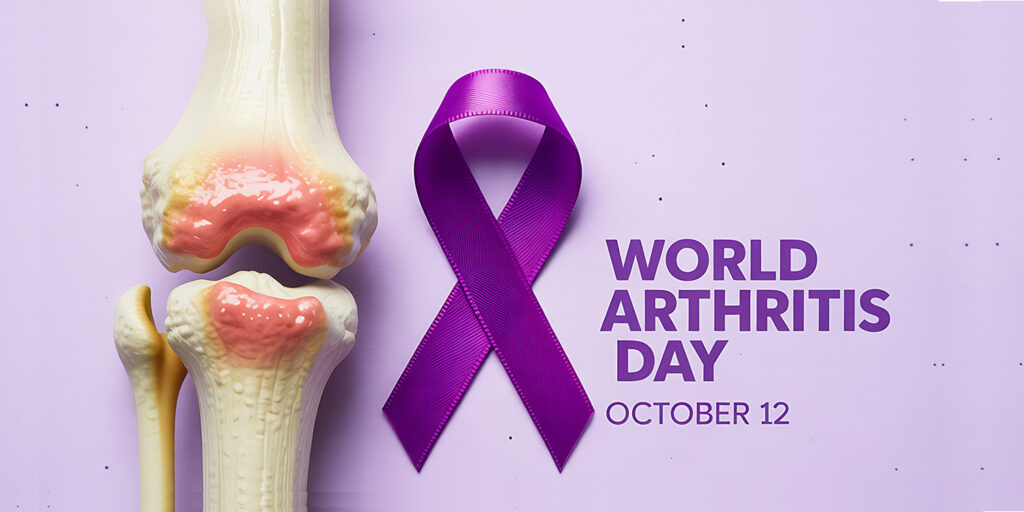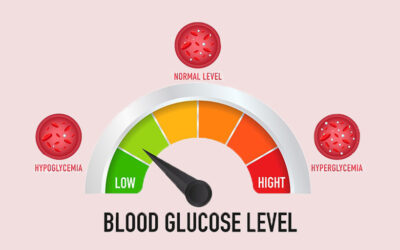World Arthritis Day 2025: Raising Awareness for Joint Health

Arthritis has become one of the most pressing health concerns of our time, and it is no longer limited to the elderly as once believed. An increasing number of younger adults are being diagnosed with different forms of arthritis, which is often linked to lifestyle changes, autoimmune disorders, and rising stress on joints from modern living. The condition not only causes pain and stiffness but also impacts mobility, independence, and overall quality of life, making it a major contributor to disability worldwide. Against this backdrop, World Arthritis Day, observed every year, plays a critical role in raising awareness, promoting early diagnosis, and encouraging both prevention and effective treatment. In this article, we will explore the significance of World Arthritis Day 2025, its theme, common signs, available treatments, prevention tips, and how Graphic Era Hospital in Dehradun is supporting patients in managing arthritis with comprehensive care.
Table of Contents
ToggleWhat is World Arthritis Day and Why is it Observed?
World Arthritis Day is observed every year on 12th October to draw global attention to arthritis and other rheumatic conditions that affect millions of people worldwide. Established in 1996 by the European Alliance of Associations for Rheumatology (EULAR), the day has grown into an international movement that unites patients, families, healthcare professionals, and advocacy groups.
The purpose of World Arthritis Day goes beyond awareness. It highlights the challenges faced by people living with arthritis, encourages early screening and diagnosis, and promotes access to effective treatment and rehabilitation. Importantly, it reminds us that arthritis is no longer confined to the elderly – young adults and even children are increasingly being diagnosed with inflammatory and lifestyle-related forms of the condition.
By observing Arthritis Day, societies and healthcare organisations across the world reaffirm their commitment to supporting joint health, reducing disability, and helping patients live active, fulfilling lives despite the burden of arthritis.
Read More: Osteoporosis: Early Warning Signs, Causes, and Treatment
The Theme for World Arthritis Day 2025
The official theme for World Arthritis Day 2025 is “Achieve Your Dreams.” This theme shines a light on the hopes, goals, and resilience of people living with arthritis and other rheumatic and musculoskeletal diseases (RMDs). It highlights that, with timely diagnosis, effective treatment, and the right support systems, individuals can continue to pursue their aspirations despite the challenges of living with arthritis.
The campaign encourages patients to share their personal stories and dreams, while calling on healthcare professionals, policymakers, and communities to ensure access to better care and resources. By focusing on possibilities rather than limitations, the theme inspires positivity and reminds society that collective action can help people with arthritis live fuller, more empowered lives.
What are the Early Signs and Symptoms of Arthritis?
Arthritis often develops gradually, and recognising the early warning signs is essential for timely diagnosis and treatment. While symptoms can vary depending on the type of arthritis, some common indicators include:
- Chronic pain: Persistent joint pain, especially in the knees, hips, hands, or spine, is one of the earliest symptoms. The pain may worsen with activity or towards the end of the day.
- Swelling: Inflamed joints may appear swollen, warm to touch, or tender, indicating underlying inflammation.
- Stiffness: Morning stiffness lasting more than 30 minutes is a common sign of inflammatory arthritis such as rheumatoid arthritis.
- Skin redness: Some joints may show visible redness or warmth, pointing to active inflammation.
- Limited range of motion: Difficulty moving joints freely or reduced flexibility in everyday tasks, such as walking or climbing stairs, may suggest the onset of arthritis.
Read More: What is a Tennis Elbow?
What are the Different Types of Arthritis?
Arthritis is not a single condition but a group of disorders that affect the joints in different ways. Here are the types of arthritis that can help in recognising symptoms and seeking appropriate treatment:
Osteoarthritis (OA)
Often called wear-and-tear arthritis, OA occurs when the protective cartilage covering the ends of bones breaks down over time. It commonly affects weight-bearing joints such as the knees and hips, leading to stiffness, swelling, and knee pain.
Rheumatoid Arthritis (RA)
Rheumatoid Arthritis is an autoimmune condition where the immune system mistakenly attacks the lining of the joints. This results in inflammation, joint deformity, and long-term disability if not managed early. It often affects smaller joints such as those in the hands and feet.
Infectious Arthritis
Also known as septic arthritis, this form is caused by bacterial, viral, or fungal infections spreading to the joint. It develops suddenly, leading to severe pain, swelling, and fever, and requires urgent medical treatment.
Gout (Metabolic Arthritis)
Gout results from the buildup of uric acid crystals in the joints, most often in the big toe. It causes sudden, severe episodes of pain, redness, and swelling, sometimes referred to as “gout attacks.”
How is Arthritis Diagnosed and Treated?
Accurate diagnosis is the foundation of effective arthritis treatment. Since joint pain can result from many conditions, doctors use a combination of clinical evaluation, medical history, and diagnostic tests to confirm arthritis.
Clinical evaluation
A joint pain doctor examines the affected joints for swelling, warmth, redness, and range of motion. They may also check for stiffness and tenderness to assess the severity of the condition.
Medical history
Information about family history, lifestyle habits, previous injuries, and the duration of symptoms helps in identifying risk factors for arthritis.
Diagnostic test
- Blood tests: Used to detect markers of inflammation, infections, or autoimmune activity, especially in rheumatoid arthritis.
- Imaging tests: X-rays, ultrasound, and MRI scans show joint damage, bone changes, and cartilage loss.
Treatment options
- Medications: Anti-inflammatory drugs, pain relievers, and disease-modifying drugs (for RA) are commonly prescribed.
- Physiotherapy and rehabilitation: Helps improve mobility, strengthen supporting muscles, and reduce stiffness.
- Lifestyle adjustments: Regular exercise, a healthy diet, and weight management reduce pressure on joints.
- Surgical options: In severe cases, joint replacement or corrective surgery may be required.
What are the Best Lifestyle Tips and Home Remedies for Arthritis?
Medical care is important, but simple lifestyle changes and home remedies can make a big difference in easing arthritis pain and improving joint health. When combined with treatment, these measures help patients stay active and comfortable in daily life. In the following points, we look at diettips, exercise, andphysiotherapy practices that can support better joint health and long-term relief:
Diet and nutrition for joint health
Eating foods with anti-inflammatory properties such as turmeric, ginger, garlic, leafy greens, and omega-3 rich sources like fish or flaxseeds may reduce joint swelling and pain. Calcium and vitamin D from dairy products, ragi, and fortified cereals strengthen bones and support mobility.
Recommended exercises
Low-impact activities including walking, yoga, and swimming enhance flexibility while reducing stiffness. Strengthening surrounding muscles also protects the joints from further wear and tear.
Physiotherapy for arthritis relief
Physiotherapy supports arthritis management by improving posture, mobility, and muscle strength. At Graphic Era Hospital, Dehradun, personalised physiotherapy and rehabilitation programmes are designed to reduce pain and promote long-term joint health.
How Can We Prevent Arthritis or Slow Its Progression?
Arthritis cannot always be avoided, especially when caused by ageing or genetic factors, but adopting the right habits can reduce risks and slow its progression. Preventive care plays a major role in protecting long-term joint health, such as:
Healthy weight management
Excess body weight puts added pressure on weight-bearing joints such as the knees and hips. Maintaining a healthy weight reduces strain and lowers the chances of developing osteoarthritis.
Avoiding joint injuries
Protecting joints during sports, exercise, or daily activities helps prevent early wear and tear. Using proper techniques when lifting heavy objects and wearing supportive footwear are simple yet effective measures.
Early screening and preventive care
Recognising symptoms such as persistent joint pain or stiffness and seeking medical advice early allows timely intervention. Regular check-ups with a rheumatologist or orthopaedic doctor can help detect arthritis at an early stage, when treatment is most effective.
Read More : Minimally Invasive Procedures: Benefits and Recovery Time
How Is World Arthritis Day Celebrated Globally and in India?
The day unites healthcare organisations, advocacy groups, and communities to promote awareness and encourage early care. Activities and campaigns are held across different settings to educate people, support patients, and highlight the importance of joint health at every stage of life. Common activities include:
Awareness Campaigns
Educational drives, social media campaigns, and public talks spread knowledge about the early signs of arthritis, prevention tips, and the importance of timely diagnosis.
Hospital Events and Health Check-up Camps
Hospitals and medical centres organise free screening camps, seminars, and patient support sessions to provide access to diagnosis and advice from specialists.
Initiatives by arthritis foundations and NGOs
Advocacy groups and non-governmental organisations run workshops, community outreach programmes, and online platforms to share resources and patient stories, helping build wider awareness and support.
Through these combined efforts, World Arthritis Day not only raises global awareness but also strengthens local support for patients and their families.
Why Choose Graphic Era Hospital for Arthritis Care in Dehradun?
At Graphic Era Hospital, arthritis care is designed to address the diverse needs of patients through expert diagnosis, advanced treatment, and long-term management. The hospital combines medical expertise with modern facilities to ensure effective and compassionate care. At Graphic Era Hospital, we provide:
Experienced Rheumatologists and Orthopaedic Doctors
At Graphic Era Hospital, arthritis care is led by a team of highly experienced rheumatologists and orthopaedic doctors who specialise in diagnosing and treating both common and complex forms of the condition. From managing age-related osteoarthritis and autoimmune disorders such as rheumatoid arthritis to addressing metabolic conditions like gout, the specialists create personalised treatment plans tailored to each patient’s needs.
Advanced Diagnostics and Treatment Options
The hospital is equipped with state-of-the-art diagnostic facilities, including blood tests, X-rays, ultrasound, and MRI scans, to detect arthritis at an early stage and track disease progression with precision. Alongside advanced imaging, patients have access to modern therapies ranging from medicines and joint injections to minimally invasive procedures that relieve pain and restore function.
Comprehensive Physiotherapy and Rehabilitation Services
Arthritis management goes beyond medicines, and rehabilitation plays a vital role in improving daily life. At Graphic Era Hospital, physiotherapy programmes are designed to strengthen muscles around the joints, enhance flexibility, and correct posture. Specialised rehabilitation services focus on reducing pain, restoring mobility, and helping patients adapt to lifestyle changes, enabling them to stay active and independent.
Let’s Take Action Against Arthritis Together!
World Arthritis Day reminds us that joint health is vital for mobility, independence, and overall quality of life. By recognising the early signs, promoting awareness, and encouraging preventive habits, this day empowers people to take arthritis seriously and seek timely care. At Graphic Era Hospital, Dehradun, patients receive comprehensive arthritis management with expert rheumatologists or orthopaedic doctors, advanced diagnostics, and tailored rehabilitation programmes designed to reduce pain and improve daily living. To consult an arthritis specialist and take proactive steps for healthier joints, call 1800-889-7351 today.
Frequently Asked Questions
What are the first signs of arthritis to look out for?
Common early signs include persistent joint pain, swelling, stiffness (especially in the morning), redness, and reduced flexibility or range of motion.
Can arthritis be cured permanently?
While there is no permanent cure, arthritis can be effectively managed with medicines, physiotherapy, lifestyle changes, and in some cases, surgery.
Which type of arthritis is most common?
Osteoarthritis is the most common form, usually linked to ageing and wear-and-tear of joints such as the knees and hips.
What foods help reduce arthritis pain?
Anti-inflammatory foods such as turmeric, ginger, garlic, leafy greens, and omega-3 rich sources like fish and flaxseeds may help reduce joint pain and stiffness.
What is the best exercise for arthritis relief?
Low-impact exercises like walking, swimming, and yoga are generally effective. A physiotherapist can recommend customised routines based on individual needs.
How can I book a consultation for arthritis treatment at Graphic Era Hospital, Dehradun?
Booking a consultation is simple. Patients can call 1800-889-7351 to schedule an appointment with an orthopaedic doctor at Graphic Era Hospital, Dehradun. The hospital provides comprehensive arthritis care, including diagnosis, treatment, and rehabilitation services.
By Specialities
- Bariatric Surgery
- Cancer Care
- Cardiology
- Dental
- Dermatology
- Diabetes & Endocrinology
- Endocrinology and Diabetes
- ENT (Ear Nose Throat)
- Eye Care
- Gastroenterology
- Haematology
- Health Awareness
- Health Care
- Health Tips
- Hematology
- Hepatology
- Internal Medicine
- Mental Health and Behavioural Sciences
- Metabolic
- Neonatology
- Nephrology
- Neurology
- Nutrition & Dietetics
- Obstetrics & Gynaecology
- Oncology
- Ophthalmology
- Orthopaedics
- Paediatric
- Physiotherapy & Rehabilitation
- Plastic and Reconstructive Surgery
- Psychology
- Pulmonology
- Rheumatology
- Spine
- Urology
Recent Posts
- 7 Lifestyle Choices That Can Help Lower the Risk of Cancer
- International Epilepsy Day 2026: A Call to End Stigma and Discrimination
- Strep Throat Treatment: Home Remedies and Effective Medical Care
- Dealing with a Stomach Bug (Norovirus)? Here’s Everything You Need to Know
- World Cancer Day 2026: Spreading Awareness, Inspiring Action
Need expert medical advice?
Share your details and our healthcare specialists will reach out to assist you.
By proceeding, you acknowledge and agree to our Privacy Policy, Terms of Use, and Disclaimer.




















